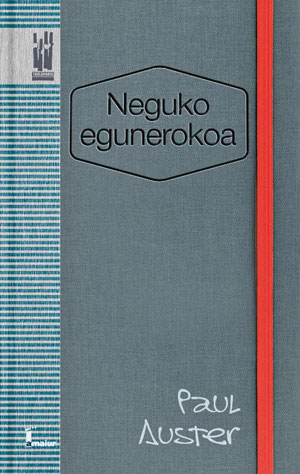A literary life

I hate when a person is engaged in writing their autobiography. What do you have to do with your head to think that your life deserves a book?
I've always thought, and I may be wrong, that two reasons can push a person to write their autobiography. The first is the lack of resources. I mean, creativity starts to run out, and therefore, it's a writer that's in its final consequences. And the second, that creativity has never existed, and therefore, he's a frustrated writer. This is not the case with our writer.
Of course, Auster has earned a lot and a lot of the merit of being a writer. I met him at the age of sixteen and since then he is one of my favorites, and so I forgive him for writing to me about his life. Traveling in your words is a pleasure for me, but it is true that in recent years your creativity has begun to run out when it comes to inventing stories. I am very aware of my rigour, because it is easy to criticise it, especially when we are accused of being frustrated writers.
The winter journal (Winter Journal, 2012) is not just an autobiography, and it has nothing to do with the rest of the writer's books. But I have to admit that he's the most austere of all I've read him.
The early traces of old age, metaphorically linked to winter, have led Paul Auster to look inside. Throughout this projection of his memory, he offers us a mixture of wireless slides that start with the winter of six years and end with the winter of sixty-five years. That's how memories, overlapping, confusing often come.
He is the second person who uses one of the slogans that separates him from the autobiography: “You think it will never happen to you” (page 7). Bam! One of Auster's most typical phrases. As a doctor who looks at X-rays, a soul that has left the body writes to reflect on the physical and emotional traces left by life: “The scar has slimmed down over the years, but it’s still there if you start looking for it and take that symbol of good luck to the grave” (pages 13-14). It is also a soul that seeks answers: “Seeing their past failures, their erroneous judgments […]. You've tried to guess the cause of this unexpected change of luck. But you have never found an answer” (page 224). Thus, we observe the characteristic metalworking effect of Auster: that of the writer who writes that reads.
The day-to-day winter can be considered as a synthesis of all his work. A life converted into literature or literary life. Is there anything more beautiful?
Paul Auster
Itzultzailea: Oskar Arana
Txalaparta, 2015
Gabonetako argiak pizteko ekitaldia espainolez egin izanak, Irungo euskaldunak haserretzeaz harago, Aski Da! mugimendua abiatu zuen: herriko 40 elkarteren indarrak batuta, Irungo udal gobernuarekin bildu dira orain, alkatea eta Euskara zinegotzia tarteko, herriko eragileak... [+]
Irailaren 9ra gibelatu dute Kanboko kontseiluan gertatu kalapiten harira, hiru auzipetuen epaiketa. 2024eko apirilean Kanboko kontseilu denboran Marienia ez hunki kolektiboko kideek burutu zuten ekintzan, Christian Devèze auzapeza erori zen bultzada batean. Hautetsien... [+]
Oinarrizko maia komunitateko U Yich Lu’um [Lurraren fruitu] organizazioko kide da, eta hizkuntza biziberritzea helburu duen Yúnyum erakundekoa. Bestalde, antropologoa da, hezkuntza prozesuen bideratzaile, eta emakumearen eskubideen aldeko aktibista eta militante... [+]
Zer jakin behar dut? Norekin erlazionatu behar dut? Non bizi behar dut? Ardura horiekin gabiltza gizakiok gure gizarteen baitan bizitza on baten ideia bizitzeko bidean. Ondo erantzuten ez badakigu, bazterretan geratuko garen beldurrez.
Joan den astean, kanpoan geratzearen... [+]
















_2.jpg)








